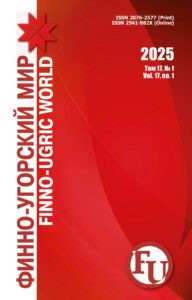Original article
doi: 10.15507/2076-2577.016.2024.03.284-297
Mordovan Dialectological Dictionary as a Linguistic, Ethnographic and Folklore Source
Elena N. Vaganova
National Research Mordovia State University, Saransk, Russia
Irina V. Lapteva
Research Institute of the Humanities by the Government of the Republic of Mordovia, Saransk, Russia
Introduction. The study of the vocabulary of the dialectological dictionary, which has its own phonetic, grammatical and lexical-semantic features depending on the area of distribution, is considered relevant because it allows one to understand the richness of the national language. The dictionary contains hundreds of local folk words and expressions that are of cultural and historical value, while remaining poorly studied from the point of view of reflecting the “language” of folk culture. The article pays attention to lexical units that are relevant to the national linguistic consciousness, focusing on the structural variability of dialect vocabulary and the preservation of old vocabulary of certain semantic fields. The purpose of the study is to consider the lexical units of the dialectological dictionary, the ethnolinguistic interpretation of the material being studied, aimed at reconstructing the corresponding fragment of the linguistic picture of the world.
Materials and methods. The material for the study was the lexical units of the Mordovian dialectological dictionary, which convey the most diverse aspects of life. The article was written in line with ethnolinguistic research. The work used the method of selecting vocabulary material, the method of identifying semantic groups, the method of semantic analysis, as well as descriptive, comparative and contrastive methods.
Results and Discussion. For the first time, understanding the regional picture of the world is considered on the basis of the Mordovian dialectological dictionary. Everyday vocabulary was subjected to analysis and a brief linguocultural assessment: folk names for kitchen utensils and food, clothing, hats, embroidery and jewelry, games and holidays, individual household items, their functions in the everyday life of a peasant. A peculiar feature of this vocabulary is its close connection with the life of the people, indicating the territorial distribution in everyday life of certain groups of the population. The article systematizes the vocabulary denoting flora and fauna, terminology of kinship and properties, special attention is paid to dilexemic complexes, which are a vivid means of expression in folklore works.
Conclusion. The dictionary is presented as a lexicographical way of reflecting the material and spiritual culture of an ethnic group, as a way of preserving folk speech culture.
Keywords: mordovian language, dialectological dictionary, dialects, dialects, collection of linguistic material, Finno-Ugric peoples
Conflict of interest: The authors declare no conflict of interest.
For citation: Vaganova E.N., Lapteva I.V. Mordovan Dialectological Dictionary as a Linguistic, Ethnographic and Folklore Source. Finno-Ugric World. 2024;16(3):284–297. https://doi.org/10.15507/2076-2577.016.2024.03.284-297
Information about the authors
E. N. Vaganova – Cand.Sci. (Philol.), Associate Professor, Department of German Philology, National Research Mordovia State University (68 Bolshevistskaya St., Saransk 430005, Russian Federation), ORCID: https://orcid.org/0000-0001-8941-846X, waganowa@mail.ru
I. V. Lapteva – Dr.Sci. (Philos.), Associate Professor, Principal Researcher, Head of Department of Theory and History of Culture, Research Institute of the Humanities by the Government of the Republic of Mordovia (3 L. Tolstogo St., Saransk 430005, Russian Federation), ORCID: https://orcid.org/0000–0002–0444–4237, laptevaiv@yandex.ru






















